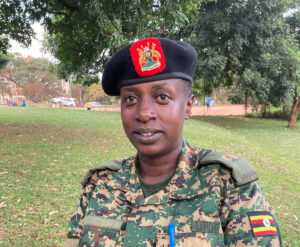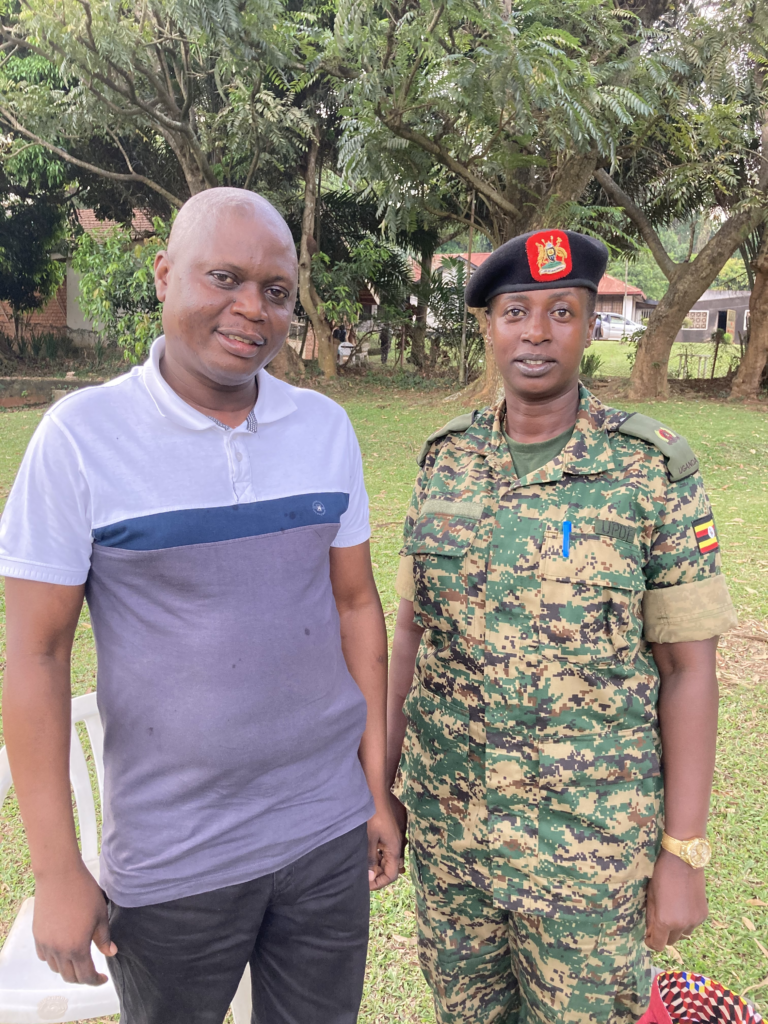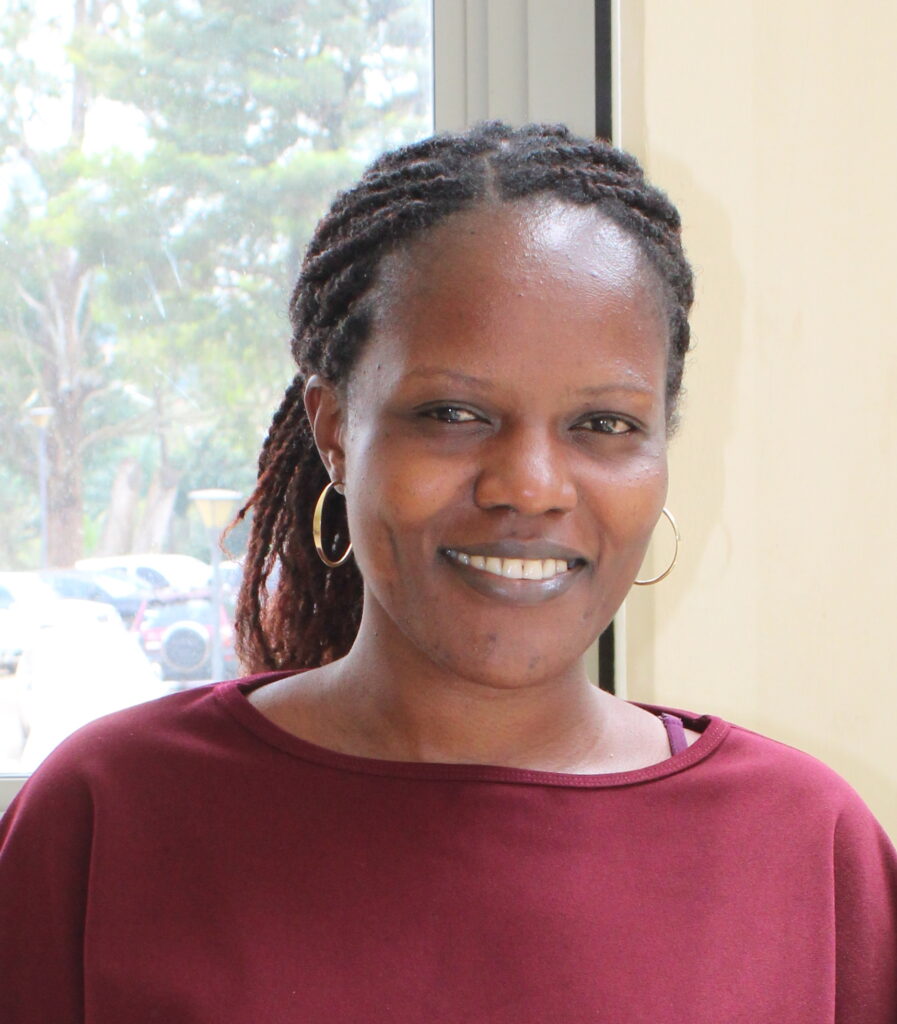Quick Chat with Hon. Major Evarlyne Asiimwe, UPDF Director D/HIV.

Hon. Major Evarlyne Asiimwe
- April 10, 2021
What are some of the success stories you have registered as the Directorate of HIV or as the military fraternity?
Hon. Asiimwe: UPDF was one of the organizations that spearheaded the war against HIV/AIDS, of course with guidance from the Commander-in-Chief. Being one of the pioneer organizations, mixing it with one of the usual soldiering, and seeing how to take care of the soldiers in hard-to-reach areas is not an achievement that we should under rate. And because of our involvement in hard-to-reach areas, you will find that we are obliged to offer our services to the people there. Usually when we take out our services, we reach out even to the communities there. So even the civilian communities have benefited a lot.
How is the uptake of services like testing? How are the figures looking in the program?
Hon. Asiimwe: Usually our figures are high as compared to Ministry of Health. But as I earlier on mentioned it’s not only soldiers. We have soldiers, their families and the communities around. Infact wherever there are services the biggest percentage of our clients are civilians. And we have a lot of testimonies of people saying they prefer services from the military facilities. Actually, in most of the programs we are performing very highly.
How has the DSDM (differentiated service delivery model) been operationalized?
Hon. Asiimwe: The DSDM model, like we go to the communities, we normally have contacts of the clients. We feel it’s convenient to take drugs to our clients than them coming to the health facilities – some of them don’t have transport, others are feeling sickly and coming to the clinic disturbs them. So, we normally have points where we have a big number of clients. And that’s where and how we deliver drugs. It worked very well during the COVID outbreak. It was there before COVID but it became even better organised during COVID because of the restrictions; but for us we had already started this model much earlier. It was started by some of the healthworkers in hard-to-reach areas where our soldiers are. So, we would get the books for certain groups of people we would refill and take their drugs to those points. COVID time increased the magnitude and it is still working.
We have even amplified it nowadays. They now go as a team – a multidisciplinary team, to a certain location and offer multiple services in that same place other than just people getting a single service. So instead of just taking drugs to a certain place X they will also do disease monitoring, TB contact tracing, even viral load services. Basically, they carry the whole hospital to the community; and on particular days people know they can be reached in their community instead of getting movement orders to travel long distances and find a health facility. As long as a battalion is there we shall offer services to both soldiers and their surrounding communities. A detailed presentation on DSDM in Uganda’s military can be found here
That is a big achievement!
Hon. Asiimwe: Yes, it is. And among the other achievements, I also want to talk about VMMC. I think it is the UPDF which started the mobile approach. And now everybody does it. It’s not just pioneering these things, but out of context, the situation dictates. We thought “if we are to start a health facility when will you finish a whole battalion? Will it even come to you?” Because they are probably deployed to go somewhere. And some of them are always deployed in far away, remote places. That is why our funding is really unique – because currently the funding is in high incidence areas. But where the prevalence is high, we may not have the troops there. You may find where the prevalence is low but yet that’s where we have troops, who need the services. When you go to a hard-to-reach place, it might not have a high prevalence but it’s hard-to-reach. Yet everyone needs a service, and it’s not only the soldiers you are sending there, but also the communities which live in those places. So for us we need to offer services even in those areas. And it’s good that PEPFAR thought funding for the military should go through URC-DHAPP, because they understand military situations and they can bargain at that level. Because now if you try to map districts of Uganda, where is HIV? The scientific way, the way they do it, is the logical and rational approach. But then you will lose a huge group of people, either those who want medication or who want prevention services.
How have prevention services evolved over the years, for example like testing services?
Hon. Asiimwe: Again, it’s still the need to reach services to soldiers located or deployed in very remote areas. And also, during war they are not allowed to move anywhere or alone. You cannot move one soldier to go for testing, you have to move in groups. So, we had to put up a team which would also be provided with security to carry their testing kits and reach where the soldiers are, secure a place whether in the room or some open space or plant tents or sometimes under a tree. They will organize and make the place spacious and also be able to remain professional even in remote settings – for example, not to compromise confidentiality. At first, we used to do one-on-one but then later on we moved to group counseling and testing. This was later on when the stigma had gone down.
What other prevention activities are happening?
Hon. Asiimwe: I think it was around 2012 to 2013 when we started talking to our partners about coming up with a brand of condoms. It was like a form of social marketing because the condoms were there, but the soldiers were not using them yet they knew how to use it and the community also knew how to use it. Whenever we talk to people we would want to find out why they are not using existing condoms. We found out that, you know when human beings get used to something, they don’t value it. So we said “let’s come up with condoms that would attract usage”. And so we kept talking to our partners, we kept pushing, so when PACE was getting their contract it’s one of the things we had said we want done. The demand really came from the army itself, it was an innovation by the army, but ofcourse we had to bring our partners on board because they are experts. We had the idea, we said “we can do a certain condom we brand it”. So, PACE did it for us, the Ulinzi condom. The demand was so high mostly because of the camouflage. Then people started saying they are so nice even when using them. The communities would come for condoms, and whenever we would take them [Ulinzi condoms] to the communities with the pink ones, people would not take the pink condoms. But unfortunately, when PACE contract was ending, I think the funding for those condoms was also ending. So now they are out of stock but wherever we go they ask for them saying “we want Ulinzi”.
The civil-military relationship: what is it and how does it work?
Hon. Asiimwe: Civil military relationship is creating synergy between the military and the civilian population. They identify things they can work on together and proceed to undertake this joint effort – either the civilian can contribute to the military or the military can contribute to the civilians. That kind of partnership. That we cannot exist in isolation. As you see the military runs its own health programs but also there are those unique things which the Ministry [of Health] provides that the military does not have capacity to provide. Then there are interventions like the “Tarehe Sita” concept, where two weeks of the army are dedicated to provide community services. This includes providing healthcare, renovating water sources, improving livelihoods in one way or another, people working with the community, etc. Now we have our biggest SACCO called Wazalendo also going out to train people on economic empowerment. But on its health program the military tries to offer the little they can offer.
Tarehe Sita is like the birthday of the UPDF- that’s when it was born. And it is believed that the army cannot work in isolation. Civilians supported the army to achieve what they wanted. So, in a way we have to give back to the community and appreciate our coexistence. So theDirectorate and partners come in because among the services we offer there are medical services then the engineering brigades doing infrastructure, sanitation where we clean up towns, fumigate and do all sorts of things. The Directorate of HIV comes in under medical services and since we have partners, they help us to implement what the UPDF wants to give back to the community.
Tell us more about your partners; at the moment you have URC-DHAPP for example?
Hon. Asiimwe: Our partners bring in essentially two things – technical competences which are not available in the military, so you can be able to get specialist health workers. They also ensure proper utilization of resources to make sure that the money given to programs really does program work. They report to the funders and also they report to the military for implementation. You can hire people for a short time with key competences and they implement a program. You get a physician, that kind of caliber – that’s what the partners do. They also ensure we all follow the guidelines of their funders and at the same time they provide services to the military.
Psychosocial services, as part of HIV and general health: what are the key issues from your world?
Hon. Asiimwe: Everything has advantages and disadvantages. From a practical point of view, I told you for us in the army we talk about anything. But also, from that context sometimes you don’t address the real issues of a person. Because sometimes people tend to gloss over things and sometimes don’t bring out issues of the heart. But otherwise we have well organized psychosocial services, we now have psychosocial counsellors and even psychologists. And the uptake of services is fairly good, people look for them. Almost every division has a psychologist and they came in as party for HIV but now they are now dealing with many other psychosocial issues. So it is holistic services that we are trying to give which are also multidisciplinary.
And being in an organized kind of set up as the military is, atleast you can be in a position to know that maybe a colleague is affected. Then we have the peers who are playing a very effective role of giving psychosocial support and identifying people who will need psychosocial support. The peer model is effective because we have some kind of comradeship; you know when you join the army the people you find there are your brothers and sisters, so you live together. So, if you are affected these people can easily know that you are affected, maybe somehow through the chain of command.
In fact, HIV has changed so many things about our culture. Soldiers used to share women. There are songs like “we eat from the same saucepan” translated from Kiswahili. Soldiers used not to have that primitive jealousy. People had solidarity here, this HIV forced people to change their way of life in. Because with HIV if you maintain that soldiers eats from the same saucepan and you end up carrying that concept to the women, all of you will die.
So, overall how is the program going – in terms of reaching 95:95:95 targets by 2030?
Hon. Asiimwe: By the way for us we are on 99: 99:99, we usually set our targets above the national targets.
And how is it looking in terms of being on track?
Hon. Asiimwe: We are pushing on, we are on track.
Is there a particular reason why you try to go over the official targets?
Hon. Asiimwe: You give yourself higher target so that you work hard to achieve. Because I remember even when the government had just put a lot effort in eMTCT, I think for us we were somewhere far. For us we try our level best.
Which ones would you say are the main challenges? For example, in addition to stockouts of Ulinzi as a preferred HIV prevention product?
Hon. Asiimwe: Some of the challenges include “pulling ropes”, like for example, in regards to the context. You know now we have global things affecting almost everything. When it comes to implementing programs in a particular unique environment it becomes a challenge for the partner or the donor to perceive and understand it the way you want it. Like these things we are talking about of HIV mobile testing – people would not want to see that which is very strange that you would go to the people, so there is the context. With many these globally-driven programs you will have challenges of coming up with effective interventions that address the real issues.
Additional information on HIV in Uganda’s military settings can be found here
About the Interview
Honourable Major Evarlyne Asiimwe currently heads UPDF’s Directorate of HIV (D/HIV). She is also a member of Parliament (MP) for Uganda People’s Defense Forces (UPDF) and an ardent golfer.



